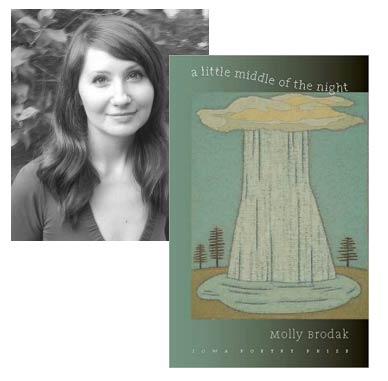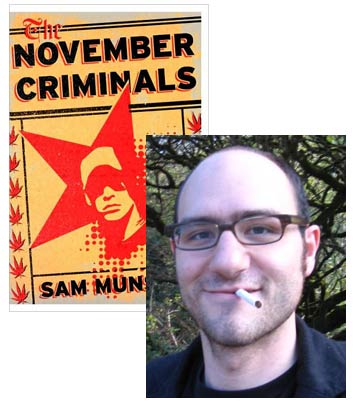Molly Brodak, “The First Poem”

Now, get up—
that horizon circle
is edgeless, unstoppable.But try.
Start with a window,
any edible box.See what you
will fit through.
Your first poemmust have been
about this crown of pines,
the cirrus clouds far off,
and the wind between them.The first poem:
wasn’t a gold ring, or
a handkerchief trick.It didn’t
ask you to sit.
Molly Brodak won the 2009 Iowa Poetry Prize for her first full-length collection A Little Middle of the Night. (Earlier this week, I featured the other Iowa winner, Samuel Amadon.) You can read several of Brodak’s poems, including the one that gives the book its title, at the website for the creative writing program at West Virginia University. There’s also “After the Accident,” an earlier poem first published in New Orleans Review, and “Poem With Substitute Words for Love,” which had been published in DIAGRAM.
(As I understand it, last night there was a celebration at Augusta State University, where Brodak teaches, to honor her prize and the publication of her work—congratulations!)
22 April 2010 | poetry |
Sam Munson Looks Back at His Second-Rate Home Town

Before the hate mail starts pouring in from our nation’s capital, this is probably as good a time as any to remind readers that the opinions expressed by Beatriceguest authors don’t necessarily reflect those of the site’s editor—that said, I didn’t grow up in Washington, D.C., so Sam Munson is in a greater position of authority to speak about his hometown than I am. New Yorkers can hear him read from his debut novel, The November Criminals, tonight at Brooklyn’s Melville House; he’ll be at Washington’s Politics & Prose in mid-June. (Oh, and I meant to note the cleverness of releasing a novel about a teenage pot dealer with an official pub date of April 20… if I hadn’t had a good reason to post something else yesterday, I would’ve played along with the gag!)
One of the two main reasons for the existence of The November Criminals: the fact that Washington, D.C., is a second-rate city. I mean this both pejoratively and as the most direct way of evoking its true character. You could argue that this was part of the intent of its founding—let’s build a city, the founders said, over this swamp, in political no-man’s land, to help defuse potential factional squabbles about state ownership of the Republic’s capital. Reasonable enough, then, that the resulting city would not be Paris or Rome (you can’t build Paris or Rome simply by willing it) but a place the likes of which I have yet to encounter outside of America.
The city with the most similar atmosphere—social stasis, an active and completely philistine attitude towards the arts, relative affluence, and a deep, uncomfortable silence about the past permeating everything—is Munich, the federal capital of Bavaria. D.C. is pretty, with copious greenery and flowers, a lot of sky, dainty Georgian and neoclassical architecture, mild weather (except for the summers, when its origins as a swamp become feverishly clear) and two rivers that—even in the worst days of their pollution—still meandered impressively among the buildings, bridges, and parkways of downtown.
D.C. is conspicuously not, however, beautiful.
21 April 2010 | guest authors |

 Our Endless and Proper Work is my new book with Belt Publishing about starting (and sticking to) a productive writing practice.
Our Endless and Proper Work is my new book with Belt Publishing about starting (and sticking to) a productive writing practice. 
